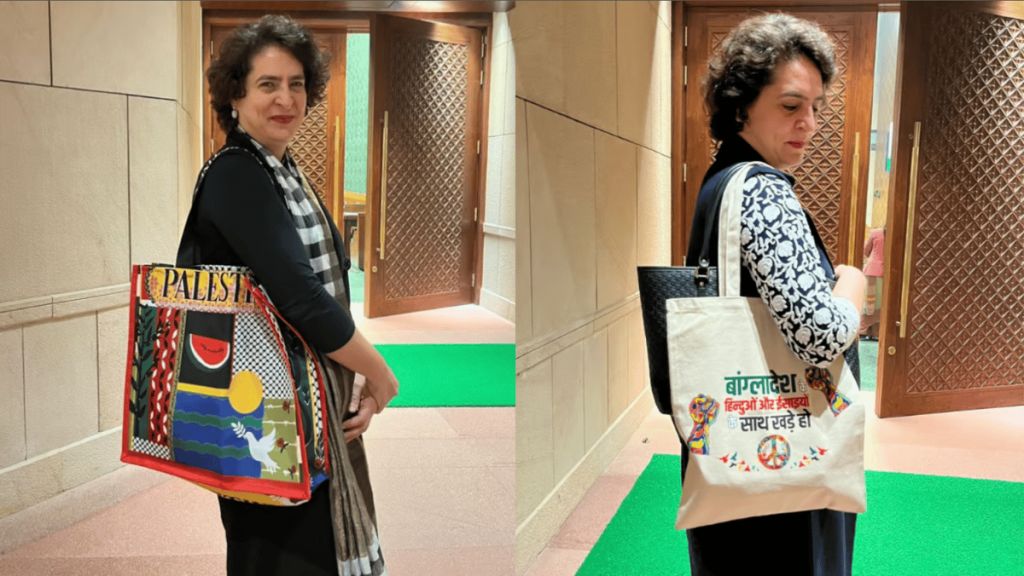
Congress leader Priyanka Gandhi, granddaughter of former Prime Minister Indira Gandhi, has stirred political and diplomatic debates with her choice of accessories. It began with a Palestinian-themed bag and has now extended to Bangladesh-themed bags carried by Congress members.
When Priyanka carried a Palestinian bag to Parliament, it appeared to signal solidarity with Gaza’s bombed civilians. Critics, however, accused her of overlooking the plight of Hindus in Bangladesh, while some praised her for supporting India’s official position in a “chic, fashionable way.”
Though this symbolic gesture was overshadowed by the Parliamentary row involving her brother Rahul Gandhi, the underlying message resonates more with India’s neighbours than its domestic electorate. To understand the implications of Priyanka’s actions, we must look at history and current geopolitics.
Indira Gandhi was a master of balancing international relationships. In the 1970s, she openly fostered ties with Yasser Arafat, the leader of the Palestinian cause, to win over the oil-rich Arab world while covertly maintaining connections with Israel.
Jewish leader Isi Leibler recalls a 1981 conversation with Indira Gandhi, where she revealed the immense pressure she faced to shut down the Israeli consulate in Mumbai. Despite India’s economic dependence on Arab petrodollars, she resisted such demands, demonstrating her strategic foresight.
By the 1980s, Israel began fostering overt and covert ties with Arab nations. Recognizing this shift, P.V. Narasimha Rao, a key figure in Indira’s government, normalized India-Israel relations in 1992 while continuing to endorse the Palestinian cause.
Fast-forward to December 2023, Minister of State for External Affairs Kirti Vardhan Singh reiterated India’s long-standing support for a two-state solution: a sovereign Palestine coexisting with Israel. This policy aligns with India’s dual approach—wooing Israel while supporting Palestine—driven by economic needs and humanitarian concerns.
The ongoing conflict in Gaza has shifted global sentiment. While initial sympathy lay with Israel after the October Hamas attacks, its aggressive retaliation—causing over 45,000 civilian deaths—has drawn widespread condemnation. Priyanka’s Palestinian-themed bag subtly aligned her with global liberal opinion, highlighting India’s nuanced stance on the issue.
Facing criticism for prioritizing Palestine over Bangladesh’s minorities, Priyanka swiftly responded by carrying a custom-stitched bag emphasizing minority rights in Bangladesh. This symbolic move redirected attention to the plight of Hindus, Christians, and Buddhists targeted by Islamist hardliners, reportedly with the complicity of Bangladesh’s military-backed regime.
The attacks on minorities, including arson in tribal Buddhist villages in the Chittagong Hill Tracts and threats to Christian churches, have drawn muted but growing criticism from Western nations. Priyanka’s gesture brought international attention to these atrocities, recalling her grandmother’s advocacy during the 1971 East Pakistan crisis.
Priyanka’s actions echo Indira Gandhi’s diplomatic playbook. During the 1971 Bangladesh Liberation War, Indira leveraged global outrage over Pakistan’s genocide in East Pakistan to build international support for India’s military intervention.
The NDA government could similarly use global sentiment against Bangladesh’s human rights violations to its advantage. Indira Gandhi, in a rare bipartisan effort, sent opposition leaders like Atal Bihari Vajpayee to garner international backing for her stance. Perhaps the current government could draw inspiration from this approach.
By addressing human rights issues in Palestine and Bangladesh, Priyanka positions herself as a liberal leader on the global stage. This aligns her with figures like John F. Kennedy, whose image, as historian David Greenberg notes, was built on “liberalism and a commitment to solving societal problems.”
However, her emergence as a global political figure faces challenges. The world’s political landscape is increasingly dominated by right-wing ideologies, which could hinder her liberal appeal. Yet, her actions have undeniably garnered international attention, suggesting a strategic pivot towards global relevance.
Will Priyanka’s “bag diplomacy” cement her position as a liberal leader with global appeal? While the jury is still out, her gestures have certainly captured the imagination of those who see her as a modern Gandhi, blending style with substance.
As Priyanka tiptoes onto the international stage, she carries the weight of her family’s legacy—one of strategic diplomacy and bold global engagement. Whether her actions resonate in a world tilting rightward remains to be seen, but for now, she has succeeded in sparking meaningful conversations, both at home and abroad.
The writer is former head of PTI’s eastern region network